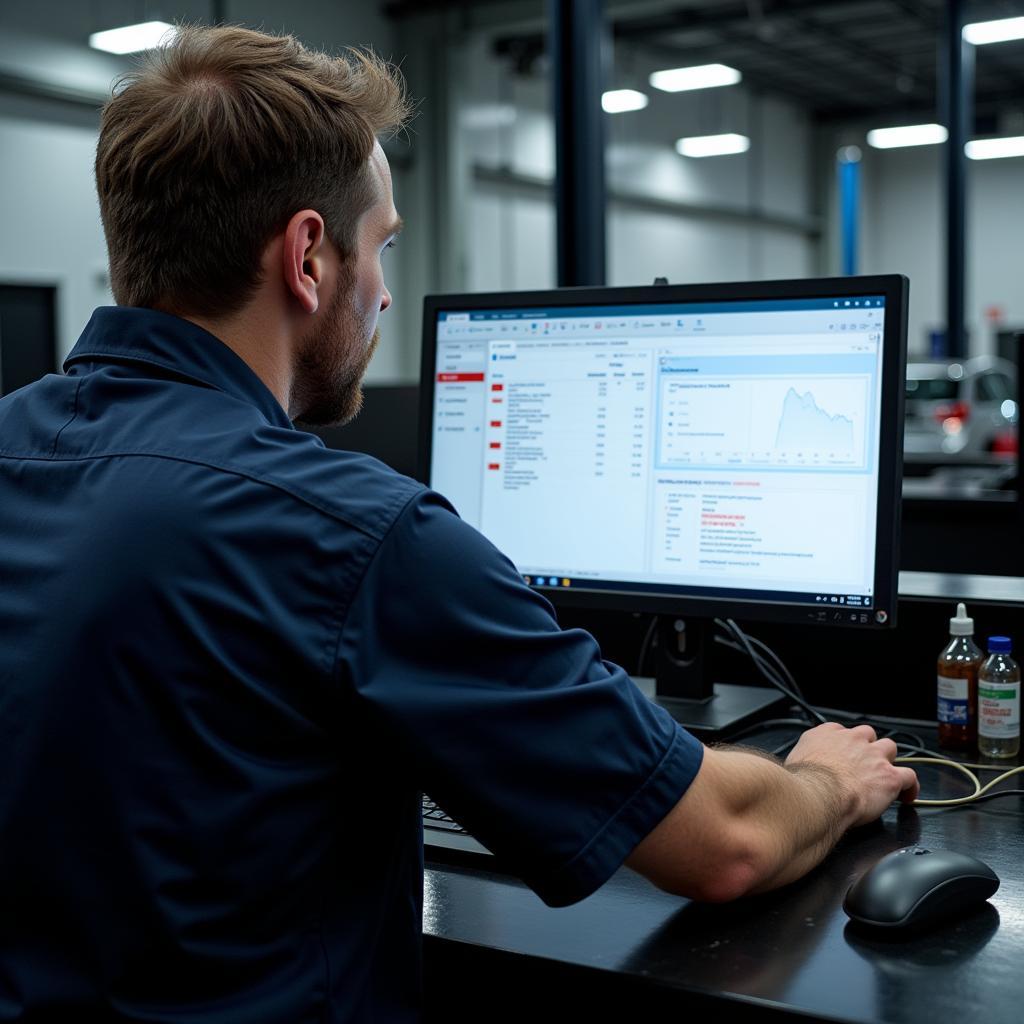A Diagnostic Car Check, also known as a car diagnostic test, is an essential part of modern vehicle maintenance. It involves using specialized equipment to connect to your car’s computer system and retrieve valuable data about its health and performance. This data can reveal hidden issues, pinpoint the root cause of warning lights on your dashboard, and help you avoid costly repairs down the line.
What Does a Diagnostic Car Check Tell You?
Think of a diagnostic car check as a physical exam for your car. It provides a comprehensive overview of various systems, including:
- Engine: A diagnostic check can identify problems with your engine’s performance, such as misfires, fuel/air mixture issues, and sensor malfunctions.
- Transmission: It can detect issues with gear shifting, clutch performance, and overall transmission health.
- Brakes: A diagnostic check can reveal problems with your anti-lock braking system (ABS), brake fluid levels, and other brake components.
- Exhaust System: It can identify issues with your catalytic converter, oxygen sensors, and other exhaust components, ensuring optimal emissions control.
- Electronic Systems: From airbags and power windows to infotainment and navigation systems, a diagnostic check can pinpoint problems with your car’s various electronic modules and sensors.
Why Are Diagnostic Car Checks Important?
Regular diagnostic car checks are crucial for a number of reasons:
- Early Problem Detection: Diagnostic checks can detect issues before they become major problems, saving you time, money, and potential headaches down the road.
- Accurate Diagnosis: By reading your car’s fault codes and analyzing data, mechanics can pinpoint the exact cause of a problem, eliminating guesswork and unnecessary repairs.
- Improved Safety: Identifying and addressing issues with brakes, airbags, and other safety-critical systems can significantly enhance your safety on the road.
- Increased Vehicle Lifespan: Regular checks and timely repairs contribute to the overall health and longevity of your vehicle.
- Better Fuel Efficiency: A well-maintained engine, thanks to regular diagnostic checks, runs more efficiently, leading to better fuel economy and reduced emissions.
When Do You Need a Diagnostic Car Check?
While it’s recommended to have a diagnostic car check performed annually, there are specific situations that warrant immediate attention:
- Warning Lights: If your dashboard lights up with a check engine light, ABS warning, or any other indicator, don’t ignore it.
- Performance Issues: Experiencing rough idling, stalling, decreased fuel efficiency, strange noises, or unusual vibrations? It’s time for a diagnostic check.
- Before Buying a Used Car: Always get a pre-purchase inspection that includes a diagnostic car check to assess the vehicle’s condition and avoid potential surprises.
- After an Accident: Even a minor accident can cause hidden damage. A diagnostic check can ensure everything is working as it should.
 Mechanic Analyzing Diagnostic Data
Mechanic Analyzing Diagnostic Data
Diagnostic Car Checks Near You
Looking for a reliable place to get your car checked? Find trusted professionals near you:
Understanding Diagnostic Trouble Codes
During a diagnostic car check, the equipment retrieves Diagnostic Trouble Codes (DTCs) from your car’s computer. These codes are standardized alphanumeric identifiers that correspond to specific issues. For example, a code like P0420 indicates a problem with the catalytic converter system.
“Understanding DTCs can be overwhelming for car owners,” says John Smith, a certified automotive technician with over 20 years of experience. “That’s why it’s important to have a trusted mechanic interpret these codes and explain the necessary repairs.”
Choosing the Right Diagnostic Tool
With the advancement in technology, there are various diagnostic tools available, from basic code readers to professional-grade scanners. While DIY options might seem appealing, it’s essential to remember that a comprehensive diagnostic check requires expertise and knowledge.
“A professional mechanic doesn’t just read codes; they interpret data, analyze symptoms, and consider the vehicle’s history to arrive at an accurate diagnosis,” explains Jane Doe, lead mechanic at a reputable auto repair shop.
Conclusion
A diagnostic car check is an indispensable tool for modern car owners. It empowers you with valuable information about your vehicle’s health, helps you address issues proactively, and ensures optimal performance, safety, and longevity. Don’t wait for a minor problem to escalate into a major headache—schedule your diagnostic car check today!
FAQs
- How much does a diagnostic car check cost? The cost can vary depending on your location and the complexity of the diagnosis, but it’s a worthwhile investment compared to the cost of neglecting potential problems.
- Can I perform a diagnostic car check myself? While basic code readers are available for DIY enthusiasts, it’s recommended to consult a qualified mechanic for a thorough and accurate diagnosis.
- How often should I get a diagnostic car check? At least once a year or as soon as you notice any warning lights or unusual performance issues.
Need Expert Car Diagnostic Assistance?
Contact us via WhatsApp at +1(641)206-8880 or email [email protected]. Our 24/7 customer support team is here to help!

Leave a Reply